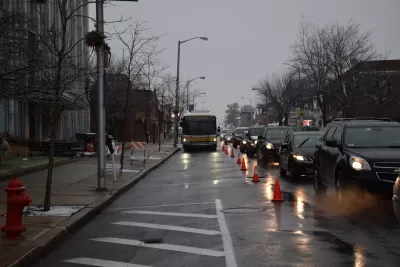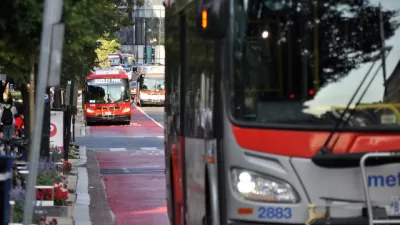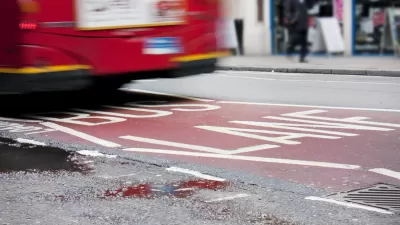The semi-legal world of quick, informal city improvements called tactical urbanism is finding a home inside transit departments.

Interested citizens will sometimes intervene to solve small neighborhood problems, like repainting a faded crosswalk or placing wayfinding signs on lamp posts. The practice has been called "tactical urbanism" and it offers the advantage of taking small actions to solve problems that cities, slowed by bureaucracy or competing interests, can be slow to address. Some transit agencies, seeing the beneficial effects of such actions, are adopting similar tactics. They’re looking for small quick fixes that can be implemented and tested at low costs.
Among other examples, a post on the TransitCenter website cites an activation from New York City: "Recently, the city expanded its 'quick delivery' repertoire for bus corridors with a rubber bus bulb-out or curb extension along the Utica Avenue corridor rather than traditional cement." Another bus project was laid out with the help of some orange cones, "In Everett, Massachusetts, a pilot project recently transformed a parking lane in a heavily congested portion of Broadway/Route 99 into bus-only lane during rush hour." Some city problems need huge spending and coordinated efforts to solve, but many don't, and nimble departments may be able find many ways to help communities.
FULL STORY: Why Tactical Transit is the Next Big Thing

Planetizen Federal Action Tracker
A weekly monitor of how Trump’s orders and actions are impacting planners and planning in America.

Restaurant Patios Were a Pandemic Win — Why Were They so Hard to Keep?
Social distancing requirements and changes in travel patterns prompted cities to pilot new uses for street and sidewalk space. Then it got complicated.

Maui's Vacation Rental Debate Turns Ugly
Verbal attacks, misinformation campaigns and fistfights plague a high-stakes debate to convert thousands of vacation rentals into long-term housing.

In California Battle of Housing vs. Environment, Housing Just Won
A new state law significantly limits the power of CEQA, an environmental review law that served as a powerful tool for blocking new development.

Boulder Eliminates Parking Minimums Citywide
Officials estimate the cost of building a single underground parking space at up to $100,000.

Orange County, Florida Adopts Largest US “Sprawl Repair” Code
The ‘Orange Code’ seeks to rectify decades of sprawl-inducing, car-oriented development.
Urban Design for Planners 1: Software Tools
This six-course series explores essential urban design concepts using open source software and equips planners with the tools they need to participate fully in the urban design process.
Planning for Universal Design
Learn the tools for implementing Universal Design in planning regulations.
Heyer Gruel & Associates PA
JM Goldson LLC
Custer County Colorado
City of Camden Redevelopment Agency
City of Astoria
Transportation Research & Education Center (TREC) at Portland State University
Jefferson Parish Government
Camden Redevelopment Agency
City of Claremont




























